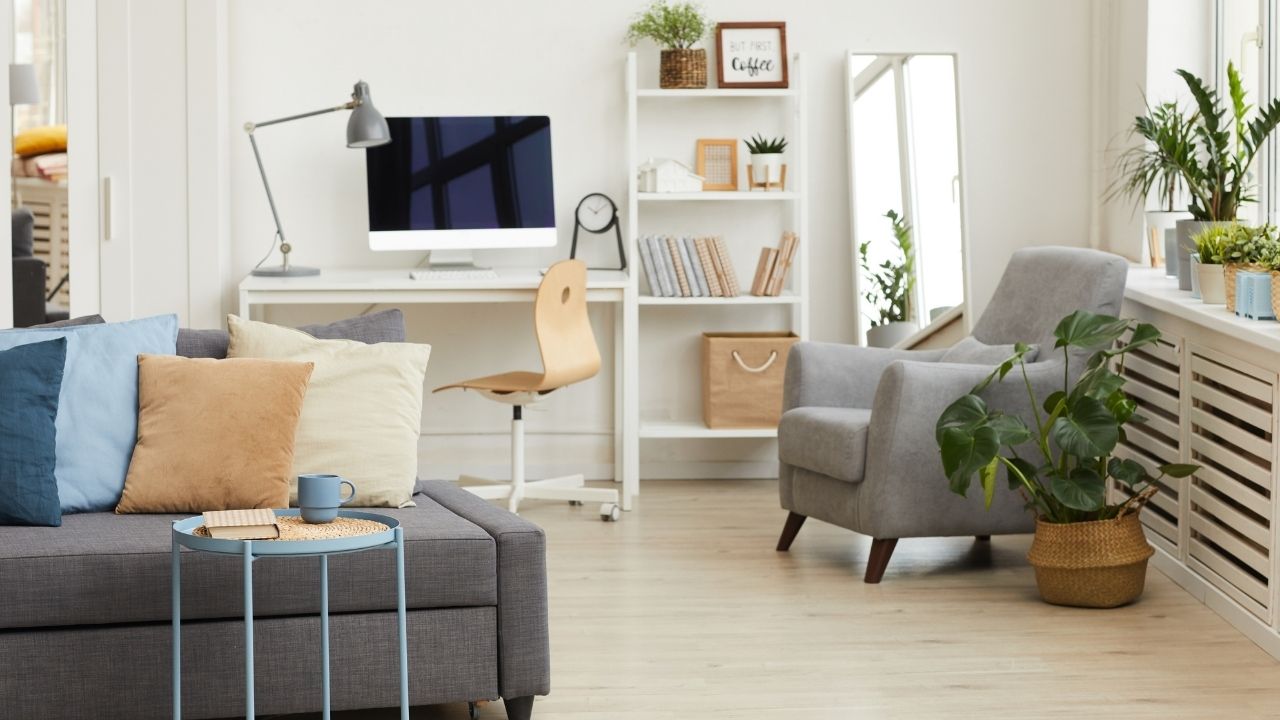- The Environmental Protection Agency found that over 9 million tons of furniture goes to landfill each year.
- Just like fast fashion, “fast furniture” also exists.
- There are sustainable and eco-friendly work design brands that eco-conscious workers can choose from to get their office furniture and accessories.
The Environmental Protection Agency found that over 9 million tons of furniture goes to landfill each year. Just like fast fashion, “fast furniture” also exists.
Unsustainable furniture is usually easy to spot – they’re cheap and poorly-made. Luckily, there are some select sustainable and eco-friendly work design brands that eco-conscious workers can utilize.
Allwork.Space is supported by its readers, and this page contains sponsored links. Allwork.Space earns a small commission when you click an affiliate link and make a purchase, at no additional cost to you. Learn more in our website policy here.
1. Mater
Founded in Copenhagen in 2006, Mater collaborates with designers to create high-end furniture and lighting.
Mater’s goal is to make all of its designs with sustainably or ethically sourced materials. This includes recycled aluminum taken from old car parts and bicycle wheels, which goes into some of its furniture and lighting products.
A big part of the Mater collection is made of wood from the fast-growing mango fruit tree, which is cut down once the tree stops bearing fruit, and a new tree is then planted in its place.
Most of the Mater collection is labeled and manufactured with FSC-certified wood. In an FSC-certified forest, no more trees than the forest can reproduce are cut down, in order to avoid exploiting nature.
2. Flexispot
Founded in 2015 in California, this work design brand produces eco-friendly height adjustable desks and desktop workstations.
FlexiSpot advocates the idea of “green and clean” and takes all initiatives to fulfill its corporate social responsibilities. The brand strives to produce eco-friendly and sustainable products that reduce the carbon footprint in the environment to help make the world a better place for all.
FlexiSpot has partnered with onetreeplanted.org to plant trees in multiple areas around the world. So far, it has planted more than 500 trees, and will continue to plant one tree for every purchase of its sustainable bamboo-made products on behalf of the customer.
Realizing that increased production of wood-based furniture drains natural forest resources — and negatively impacts the environment — FlexiSpot now sources more sustainable materials for its desktops. It is currently developing bamboo standing desks made from 100% natural bamboo, which grows faster and greener.
To package every product, the company uses recycled materials that minimize its environmental impact by reducing its contribution to landfill waste.
3. Tala
Founded in 2013, Tala is a British lighting brand based in London. The company specializes in low-energy LED lighting products that recreate the warm glow of traditional incandescent bulbs.
Tala runs a reforestation program where it donates a portion of its revenue to tree-planting programs across the globe in an effort to offset the carbon emissions generated by its production.
Its recycling partner, First Mile, ensures that zero waste is sent to landfill, and all of its electricity is supplied by the renewable energy supplier, Bulb.
In the U.K., the brand partners with The Heart of England Forest on building and protecting a vast, new unbroken woodland of native, broad-leaf trees in the middle of England.
In the U.S., Tala works with the National Forest Foundation to restore ecosystems across the country by planting in areas that have been affected by forest fires.
4. Ergonofis
Founded in 2016 in Montreal, Quebec, Ergonofis creates standing desks, ergonomic chairs, and accessories for the workplace.
According to Ergonofis, sustainability is one of the main values it was built on.
The company ensures the wood it uses for its wooden standing desks is sourced from sustainably managed and durable forests. Its maple, cherry wood, and walnut wood come from Canada and the U.S. from distributors that do not practice clear-cutting.
Ergonofis wants to focus on the long term and ensure that the forests are managed in a way that does not harm the ecosystem, that protects wildlife, and that is going to be reseeded for future generations to benefit from.
“We believe it is critical to think about how our business affects our community and the environment. Buying from and working with local companies not only invests money into our community, increasing jobs, and contributing to public services, but also reduces our environmental impact by limiting the distance our materials need to travel,” the brand says on its website.
5. Bolon
Founded over 70 years ago in Stockholm, flooring designer Bolon has made sustainability the core of its beliefs since its inception, with its first product being rag rugs produced from vinyl waste.
Bolon manufactures all of its products in Ulricehamn, Sweden, where it also recycles its own flooring and the waste from other companies in the area into raw materials before using them to create new pieces of flooring.
Bolon produces its own raw materials and mainly works with suppliers within a 25-mile radius, which means less transportation is required, and therefore less carbon emissions are produced.
All of the company’s flooring products contain up to 33% recycled materials, and are manufactured with 0% waste in a production site that runs on 100% renewable energy from either water or windmills and local groundwater cooling.
6. West Elm
West Elm provides Fair Trade Certified office desks that are both stylish and environmentally friendly. This furniture company is also GREENGUARD Gold Certified, and their mid-century style desks are made ethically in Vietnam and India using FSC-certified wood and water-based coatings.
Wherever possible, the brand says it’s sourcing more FSC‑certified, recycled and upcycled materials and creating less waste.
Today, 60% of its product sales support at least one of its sustainability initiatives, and 100% of its all-cotton bedding and bath towels are sustainably sourced, including organic.
“We’re focused on expanding our use of low-impact materials, reducing waste and prioritizing circularity,” West Elm’s website says.
West Elm has helped to train 550+ farmers in more sustainable practices in 2020 through its partnership with the Better Cotton Initiative.
7. Knoll
Founded in 1938 in Pennsylvania, Knoll produces office systems, seating, files and storage, tables and desks, textiles, and accessories for the office.
Knoll uses responsibly sourced materials and promotes a healthy operational infrastructure. Governed by Knoll Design for the Environment (DFE) policies, each product it designs and manufactures targets environmental standards relating to its material content and production process.
Knoll requires documentation for materials on post-consumer and post-industrial recycled content, and the brand is committed to Life Cycle Assessments to measure environmental impacts.
“When we think about sustainability, we think about the decisions that shape the daily lives of our clients and community. We consider the environmental, economic and social factors tied to design, manufacturing and management decisions, from responsible materials sourcing to the well-being of our associates,” Knoll says on its website.


 Dr. Gleb Tsipursky – The Office Whisperer
Dr. Gleb Tsipursky – The Office Whisperer Nirit Cohen – WorkFutures
Nirit Cohen – WorkFutures Angela Howard – Culture Expert
Angela Howard – Culture Expert Drew Jones – Design & Innovation
Drew Jones – Design & Innovation Jonathan Price – CRE & Flex Expert
Jonathan Price – CRE & Flex Expert













